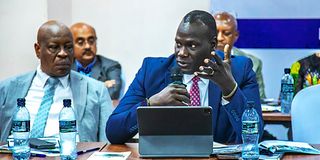South Sudanese outlines priorities as he assumes East African Business Council chairmanship

What you need to know:
- Akol will serve a two-year term starting December 14, 2024, succeeding Angelina Ngalula, who held the position since June 2022.
Arusha. John Lual Akol Akol from the South Sudan National Chamber of Commerce, Industry, and Agriculture has been elected Chairperson of the East African Business Council (EABC).
Akol will serve a two-year term starting December 14, 2024, succeeding Angelina Ngalula, who held the position since June 2022.
His election took place during the EABC's 23rd Annual General Meeting (AGM) yesterday at Mount Meru Hotel in Arusha.
In his acceptance speech, Akol thanked the outgoing Executive Committee for their leadership and pledged to uphold the EABC's mission to represent the private sector and promote a borderless East Africa.
"I will advocate for policies that attract investment and foster economic growth across East Africa," Akol said.
The East African Community (EAC) economy has shown resilience despite global challenges, with projected growth of 5.48 percent in 2024, up from 4.9 percent in 2023. Intra-EAC trade grew by 13.1 percent, reaching $12.1 billion in 2023, although it remains at 15 percent of total trade in the region.
Arusha Regional Commissioner Paul Makonda, represented by Assistant Regional Administrative Secretary Frank Mmbando, commended the EABC's efforts in driving regional economic integration.
Makonda urged EABC leaders to invest in key sectors such as edible oils and textiles, citing opportunities linked to the upcoming Africa Cup of Nations, co-hosted by Tanzania, Kenya, and Uganda.
"It is vital to explore opportunities in industries like edible oil processing and textile manufacturing to reduce reliance on imports, especially second-hand clothes," Makonda said.
Interim EABC Director Adrian Njau called for stronger public-private collaboration to create stable, long-term investment frameworks.
"Our governments must commit to providing predictable environments to attract investors," Njau stated.
He also praised CRDB Bank for expanding operations across the region and encouraged other businesses to pursue similar cross-border ventures.
The 23rd AGM reviewed EABC's performance and strategies, reaffirming its commitment to fostering investment and economic growth in East Africa.




